By: Morgan Clark-Gaynor
Chris began our phone call with a warning that he would be dipping in and out of Fred Meyer. With a good-natured chuckle, he said “I don’t mean to be disrespectfully double tasking, but I am on break and I need to get milk.” He needed something to drink with his pop tarts, something I think we can all empathize with. “‘Cause, what am I supposed to do with the pop tarts? Just eat them dry? Like what is that even?” I assured him that I understood his predicament, and he assured me that he would be present in our interview despite his mission. Throughout our interview, Chris was able to balance focus and distraction beautifully, exhibiting a paradoxical intrigue also inherent to his art. From his early inspirations to his current work, Chris utilizes dialectic to capture holistic complexity.
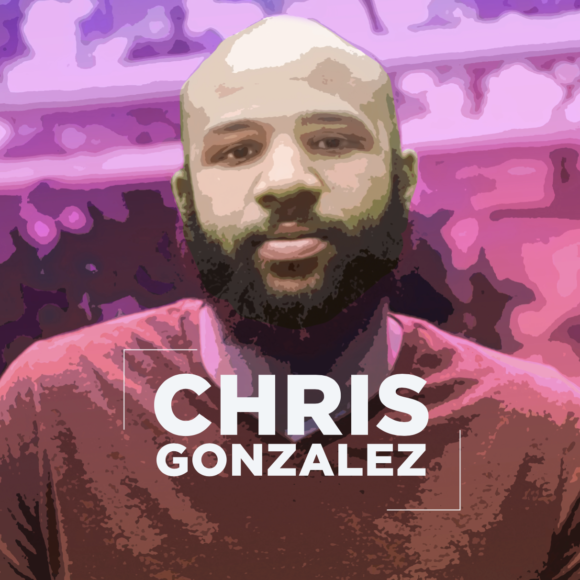
Chris is a resident artist at the CoHo Lab. His latest work, OK Abner, is scheduled to be streamed to general audiences on May 16th on the CoHo YouTube channel. Amongst other proclivities, Chris moonlights as a poet, playwright, physical theatre teacher, and director. I had a genuine blast talking with him for our interview, and I am excited to relay his charm, passion, and dynamic dissonance to you now.
“You’re intuiting the truth. But you also have no idea what’s going on.”
Chris immediately struck me as a particularly delightful person to chat with. Even though the interview was about him, he began our conversation with a check-in, flipping the tables and asking how I was. “Oh yeah, I’m good!” I responded. Chris went on to ask how I was connected to CoHo, and we took some time to get to know each other. I looked out the window of my home office as we settled into our energetic back-and-forth on the phone. I watched bluebirds bathe themselves in my neighbor’s gutters and eventually asked him if he was ready to begin the interview. He responded, “I’m ready.”
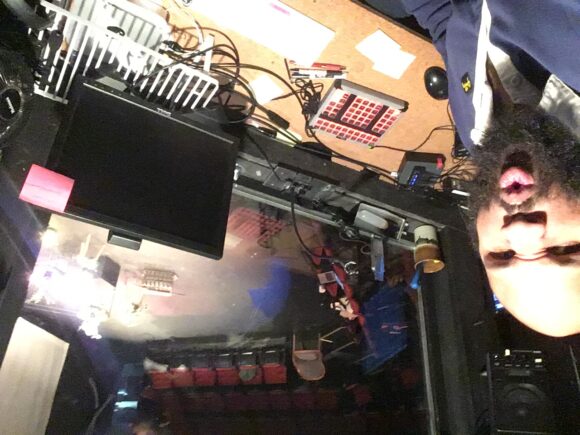
I began with a simple question, a nice and easy slowball. I just wanted to know what his relationship is to the entirety of the performing arts. Chris responded, “I’m involved in teaching. I teach devised physical theater, I like devised theater. Did you ever do any of that shit?” I told him that I had done a year-long intensive in devised theater; he noted that a year to focus on art is a great gift. “In the UK, before COVID, you could spend two years on a show and get paid full wages and shit like that because they subsidize the arts there.” In a manner that became consistent throughout our discussion, Chris brought in an extremely clear awareness of the larger socio-political context in which the arts are situated.
Moving forward from this macro-scale analysis, he smoothly returned to the details of his personal artistic identity. “I teach, which I really enjoy because I can use the students and the teaching relationship to develop my own ideas.” He explained that the classroom offers him the resources he needs to test and develop new ideas. After being inspired to teach physical theatre by a company in Ipswich, England called Gecko, Chris taught at The School of Contemporary Dance and Thought in Massachusetts and Portland Playhouse here in Oregon.

Through his experimentation, Chris discovered that he’s a bit of a paradox. He is both a lover and hater of words, making his art complex and flexible. The use of gesture, choreography, and movement to communicate fascinates him. He adores mime, clown, and dance as non-verbal languages of the stage. Simultaneously, as a poet and playwright, he absolutely loves the written word. As he put it, “As much as I’m like ‘don’t put any words in it’ I’m also on the opposite side like ‘I want all words’ too.”
Chris’ love of words landed him a job as an arts critic. He wrote reviews in the Willamette Week, Portland Mercury, the Oregon Arts Watch, and the Oregonian where he relayed the latest theatrical experiments to the broader Portland community. This job satisfied his deep nerdhood for theatre, “I love the history of theatre… talking about theatre… hating theatre.” Though he loved to hate some theatre, he never demolished anyone’s work. “The whole point of the reviews was to support theatre because I know how much of a miracle it is to even get five people in a room. I was trying to uplift local theater makers with the reviews.”
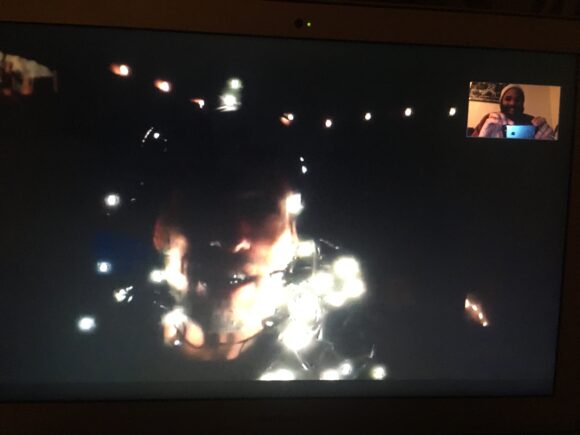
Laughing, he said that hating some theatre was also a language of love. “You’ll see that one show that totally redeems all the shitty shows, and it’ll change your life. Do you have a show like that? Where after you saw it, basically the course of your life was different?” Of course I had a show like that. I told him about an expressive dance placed right in the middle of a Third Rail Production of Arlington: (A Love Story) by Enda Walsh. I told Chris how my friend and I were both viscerally connected to the meaning inside that dance, though these meanings were completely independent from each other. He responded, “Visceral is a good word to describe what you can get from that non-verbal communication. That immediate perception of like, ‘Woah, I know this.’ It’s incredible, it can be the most beautiful thing.”
He referred to a show that Gecko had put on, with many languages utilized all at once. Like non-verbal theatre, this tactic also achieved universality. “It kind of brought me into a dream world where you know what’s going on, you’re totally intuiting the truth, but you also have no idea what’s going on. I love it when that’s done right and it’s perfectly baked, perfectly cooked – it’s the best. It’s transporting. It’s transcendent.” Through his many lives as an actor, deviser, and writer, Chris has developed a keen sense of how to reach people’s capacity for empathy and perception. He has honed this skill by leaning persistently into, and fearlessly away from language.
“Fuckin’ launch off the earth.”
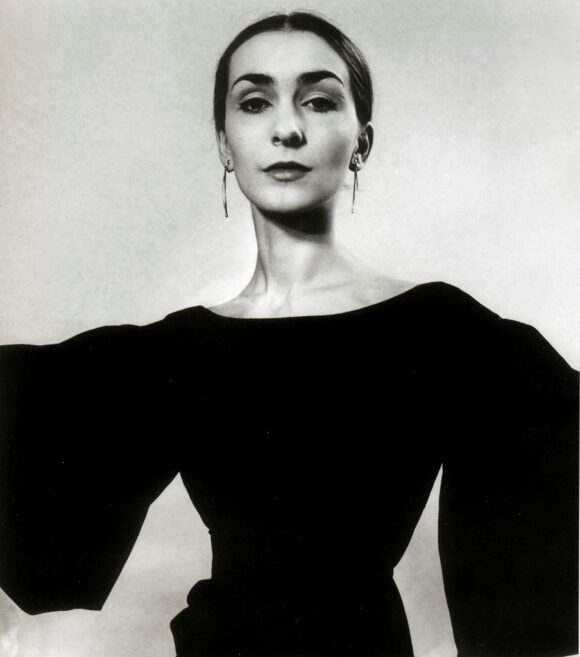
When I asked Chris which disciplines and inspirations have been pivotal to his development as an artist, he cited influences that taught him the principles of transcendence. He loves Gecko for their rigorous approach, and for this same reason, he loves Pina Bausch. Both of these sources showed Chris what performers were truly capable of and what can happen when you push them there.
We forged ahead and dug into Chris’ artistic aesthetic, the common thread between his many passions and projects. In both his writing and movement work, Chris likes things that are accessible and enjoyable to watch, “I like things that are conversational, I like things that are colloquial. I’m not a heightened language guy, I’m not enigmatic.” He likes performance that’s relaxed, and writing that is clear. He wants his audiences to be able to fully receive his work. However, in a similarly complex paradox to his relationship with words, Chris also loves truly difficult performance. “I like rigor, like when an actor goes out there and it’s just rigorous as fuck. Like the actor has a fuckin’ thrity page monolouge and they just have to fuckin’ do it!” He wants actors to be able to really sink their teeth into a play, “And then they can fuckin’ get in gear, and then they can just fuckin’ launch off the earth.”
“I want the fucking people on stage to be actually breathing really hard! You know what I mean? I want them to be actually out of breath, not just acting! Because then that breath becomes almost ritualistic. They’re taking you somewhere because they’re putting in fucked up amounts of effort, it’s so intricate. [Pina Bausch and Gecko] showed me that rigor helps you get to transcendence.”
Chris then swung to the verbal side of his creative pendulum and called on Shakespeare as a major influence. Shakespeare taught him that he can write living characters into existence, characters that transcend the play. “When you think about Macbeth, you don’t fucking think about Macbeth. You think about Lady Macbeth! I want to see a play where it’s just Lady Macbeth, going ham for like an hour. That would be everything.” Through the power of words and movement, Chris aims to push audiences and performers into a pivotal experience that extends beyond closing night and into our everyday lives.
“It can’t just be someone spewing their trauma.”
In classic Chris fashion, he reflected on his experience studying Shakespeare in college with an awareness of the larger context. In a funny mock nasal tone, he impersonated the very common, myopic style of Shakespearian study, “If there’s a capital T, you’re supposed to do this! If there’s a space, you’re supposed to do that!’” Though he appreciated this approach for a time, he soon realized its limitations and got invested in the actual storylines Shakespeare was formulating. In his fascination with the bard, Chris developed a theory for Shakespeare’s transcendent characters: “There are different ideals at odds within the characters- different philosophies, different kinds of politics, different kinds of belief systems that exist within individual characters.” He decided to apply this rule to his own writing. “I try to find characters and then put antithetical political/psychological tendencies or tensions within them.” As his characters struggle with ambiguity and reveal their capacity for both love and hate, they become acutely interesting to watch.
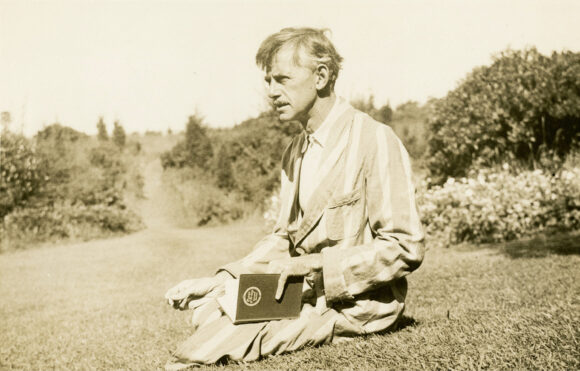
To complement his adoration of William Shakespeare, Chris calls upon the works of Eugene O’Neill. O’Neill introduced Chris to the idea that one could combine rigor and words into a very long, intensive, ethically, and emotionally confusing monologue. “Eugene O’Neill was so narcissistic and just a bad person, but he wrote these fucking incredible solo pieces where a character could go on for twenty pages. And it was fire! It was fire the whole time. That shit was crazy!” He appreciates the intentional craft behind O’Niell’s portrayal of messiness, exhibiting yet another intriguing paradox within his own style: structure paired politely with absolute chaos.
Chris compared writing a monologue to prepare a solo piece for a cello performance. “It can’t just be someone spewing their own trauma. It has to be structured.” This is a delicate art form mastered by O’Neill. Chris admires how O’Neill was able to give shape to pandemonium in order to reveal the relentless complexity of human relationships. “I love how deep he would go. I love how his characters would just get shitfaced and go into that ambiguity of ‘I love you… but I hate you…I forgive you….but I still resent you.’ And his characters were the first ones I ever heard say shit like that to each other.” Inspired by O’Neill’s ability to wrangle chaos, Chris strives to write characters with deeply human dissonance.
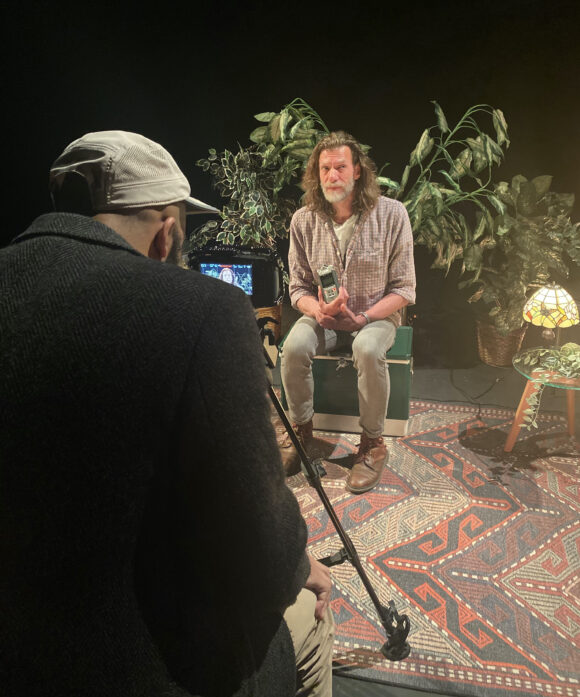
“The play is about apologies.”
When describing the basic plot of his latest piece, Chris let me into a secret: “It’s semi-somewhat autobiographical.” OK, Abner deals with a white father living in rural Oregon, and his adoptive Black daughter living in Portland. Abner, the father, gives his daughter a “whiter” name in order to conceal her Blackness. Though he knew this was wrong, he thought it was the right thing to do in order to “protect” her. This misjudgment is a result of the father’s childhood, riddled with abuse from his own father. As Abner tries to apologize to his daughter for his mistake, he relays his childhood trauma in a disorienting mix of dismissal and vulnerability. “So, then, where in that is an acceptable apology for wrongdoing? Is that an apology worth accepting?” Chris explained that his first reaction to that question was no, because such an apology isn’t legitimately taking accountability. But at the same time, “The play tries to show that when someone apologizes by mainly talking about how they were hurt, this can sometimes be genuine and sincere trying and effort.” OK, Abner empathizes with the ambiguity of intergenerational trauma and the struggle to own your piece of it.
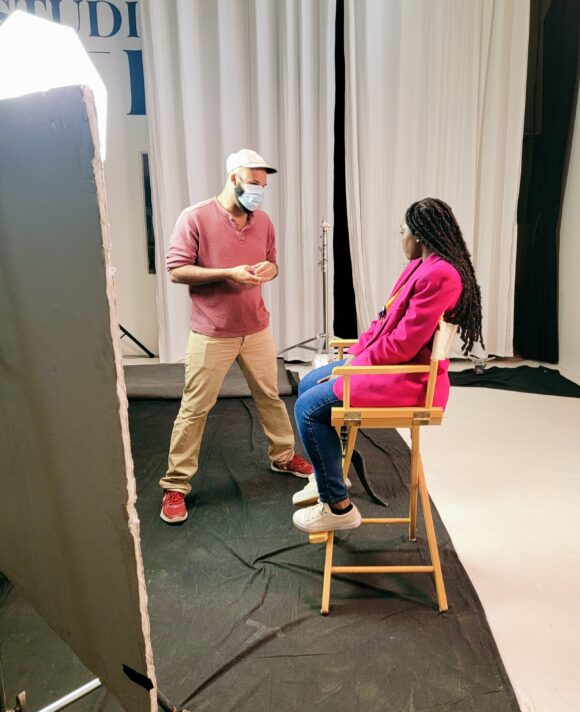
Chris combines the styles of O’Neill and Pina Bausch to dream up realities wherein filial accountability can be attempted. “In order for Abner to fully understand his daughter’s experience, he has to face his own. And most parents aren’t gonna suddenly start being an introspective powerhouse.” Abner’s ability to reflect on his parenting and the damage he has caused is a step beyond what most people get from their family. “I’m using theatre to write realities that I wished were my own and could never be. My parents could never do what this character is capable of.” With O’Neillian artfulness, Chris structures the chaos of shitty parenting into a catharsis that we can all understand.
“Standup Tragedy.”
Mid interview, I heard a baby screaming in the background buzz. Chris says to me “I’m also about the leave Fred Meyer, by the way… ok leaving Fred Meyer.” Then to the kid, “Oh yeah, homie,” then back to me, “That was just a child… ok we’re in the clear.” Once he’d exited the store and we’d laughed at the absurdity of this interview, I asked if he could describe his show with sensory language. And then, right on cue, his grocery bag broke. “Right as I got home the handle bag broke. That’s perfect.” Pushing past the madness, he spun together one of the most intriguing descriptions I’ve heard: “This play is horror, meets stand up comedy, meets documentary interview. I’ve also called it standup tragedy, which I love.” I asked if this was his tagline, and he said no- that was “wolves, whales, aliens, and intergenerational trauma.” Obviously.
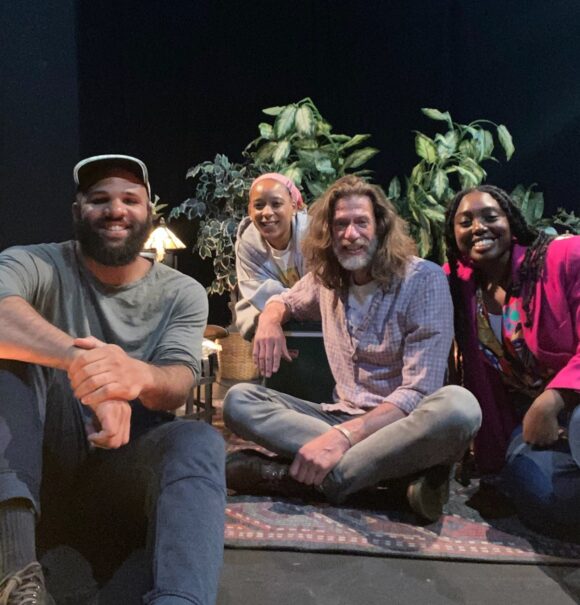
Ok, Abner is the first in a series of monologues that focus on Oregon lore. “I don’t know if you ever heard of the time they blew up the whale on Florence beach? They had a beached whale and they blew it up. That figures really heavily into my play.” Drawing on our socio-political context again, he added, “There’s a bunch of shit in Oregon between conservationists and people who live in rural areas.” For instance, city dwellers will pass legislation to conserve the wolves, but then rural folks have to clean up the mess when their sheep are eaten. On top of natural predators, rural Oregonians also have to contend with mystical gore. “There were these really interesting cattle mutilations. Some people were like ‘oh, it’s a cult’ others were like ‘no, it’s aliens’ other people were like ‘no it’s the farmers themselves.’” Apparently, cows in the outskirts of Oregon have been subject to bewildering, surgically specific mutilations for a while now. The mystery of these incidents remains unsolved. Chris uses these issues to study Oregon’s city-rural divide, and in doing so reveals how tangled in confusion we all are. This confusion is reflected in our intimate relationships, resulting in tragic missteps and intergenerational violence.
“To me that’s the best thing ever, like what the fuck?! That’s what words can do! Words can do that!”

In a stunning fractal of paradoxes, Chris manages to knit together a very human story. Utilizing his love of non-verbal universality and complicating verbiage, he has effectively created a piece of profoundly resonant ambiguity. It was an absolute pleasure to hear his authentic passion for theatre and the work he is cooking up in the lab. Tickets to Ok, Abner are available now. All tickets are Pay-What-You-Can, so find a price point that feels right and reserve your virtual seat to this standup tragedy.
Thank you for tuning in for Chris’ spotlight on the CoHo blog. It’s been inspiring to watch our residents’ projects grow over these last three weeks and I can’t wait to see them come to life on a virtual screen. We are eternally grateful for your support of these fantastic local artists. See you in the chatroom!
Morgan Clark-Gaynor
Theatre Maker
Improviser and Deviser
Operations Assistant with Coho Productions





